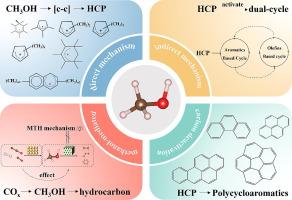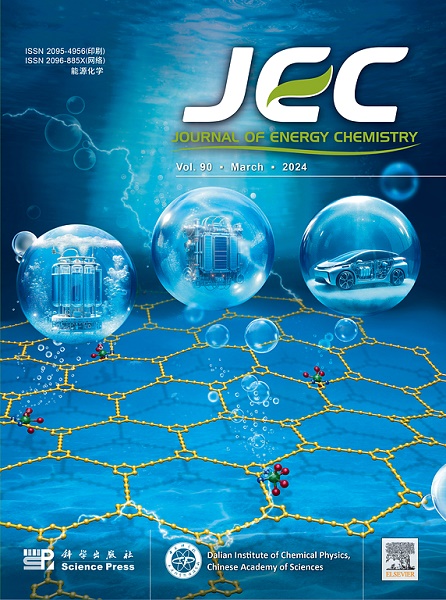甲醇转化和甲醇介导的串联催化对碳氢化合物的机理研究
IF 14.9
1区 化学
Q1 Energy
引用次数: 0
摘要
甲醇是一种重要的C1中间体,它既是CO/CO2的多功能加氢产物,又是碳氢化合物合成的活性中间体,将传统的化石化学过程与新兴的可持续催化技术相结合。尽管在甲醇制烃(MTH)转化方面取得了重大进展,但对反应机理的全面了解仍然是提高催化剂设计和工业适用性的关键。这篇综述批判性地综合了与甲醇转化和甲醇介导的催化过程有关的机制见解的最新进展。首先,我们通过直接和间接机制系统地概述了初始碳-碳(C-C)键形成的关键反应途径,强调了光谱分析和理论计算方面的重大突破。随后,我们强调了MTH过程的自催化特性和双循环机制,批判性地评估了沸石结构、孔径、拓扑结构和酸度在控制产物选择性和催化剂稳定性方面的作用。此外,我们还讨论了采用甲醇作为COx加氢关键中间体的串联催化系统的最新发展,强调了可转移的机理原理和催化见解。最后,我们确定了未来的研究方向,包括阐明精确烃池(HCP)中间体,通过计算指导设计优化沸石结构,以及利用先进的表征方法和人工智能开发强大的催化系统。通过整合催化科学、材料工程和反应工程的多学科方法,本综述为合理设计和优化先进的催化系统以实现高效的甲醇转化过程提供了可行的指导。本文章由计算机程序翻译,如有差异,请以英文原文为准。

Mechanistic insights into methanol conversion and methanol-mediated tandem catalysis toward hydrocarbons
Methanol, a crucial C1 intermediate, bridges traditional fossil-based chemical processes with emerging sustainable catalytic technologies by serving as both a versatile hydrogenation product from CO/CO2 and an active intermediate for hydrocarbon synthesis. Despite significant progress in methanol-to-hydrocarbon (MTH) conversion, a comprehensive understanding of reaction mechanisms remains essential to enhance catalyst design and industrial applicability. This review critically synthesizes recent advances in mechanistic insights related to methanol conversion and methanol-mediated catalytic processes. Firstly, we systematically outline key reaction pathways involved in initial carbon–carbon (C–C) bond formation through direct and indirect mechanisms, emphasizing significant breakthroughs from spectroscopic analyses and theoretical calculations. Subsequently, we highlight the autocatalytic characteristics and dual-cycle mechanisms underlying MTH processes, critically evaluating the roles of zeolite structures, pore sizes, topology, and acidity in governing product selectivity and catalyst stability. Additionally, we discuss cutting-edge developments in tandem catalytic systems employing methanol as a pivotal intermediate for COx hydrogenation, emphasizing the transferable mechanistic principles and catalytic insights. Finally, we identify future research directions, including elucidating precise hydrocarbon pool (HCP) intermediates, optimizing zeolite structures through computational-guided design, and developing robust catalytic systems leveraging advanced characterization methods and artificial intelligence. By integrating multidisciplinary approaches from catalytic science, materials engineering, and reaction engineering, this review provides actionable guidance towards rational design and optimization of advanced catalytic systems for efficient methanol conversion processes.
求助全文
通过发布文献求助,成功后即可免费获取论文全文。
去求助
来源期刊

Journal of Energy Chemistry
CHEMISTRY, APPLIED-CHEMISTRY, PHYSICAL
CiteScore
19.10
自引率
8.40%
发文量
3631
审稿时长
15 days
期刊介绍:
The Journal of Energy Chemistry, the official publication of Science Press and the Dalian Institute of Chemical Physics, Chinese Academy of Sciences, serves as a platform for reporting creative research and innovative applications in energy chemistry. It mainly reports on creative researches and innovative applications of chemical conversions of fossil energy, carbon dioxide, electrochemical energy and hydrogen energy, as well as the conversions of biomass and solar energy related with chemical issues to promote academic exchanges in the field of energy chemistry and to accelerate the exploration, research and development of energy science and technologies.
This journal focuses on original research papers covering various topics within energy chemistry worldwide, including:
Optimized utilization of fossil energy
Hydrogen energy
Conversion and storage of electrochemical energy
Capture, storage, and chemical conversion of carbon dioxide
Materials and nanotechnologies for energy conversion and storage
Chemistry in biomass conversion
Chemistry in the utilization of solar energy
 求助内容:
求助内容: 应助结果提醒方式:
应助结果提醒方式:


